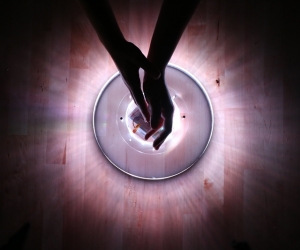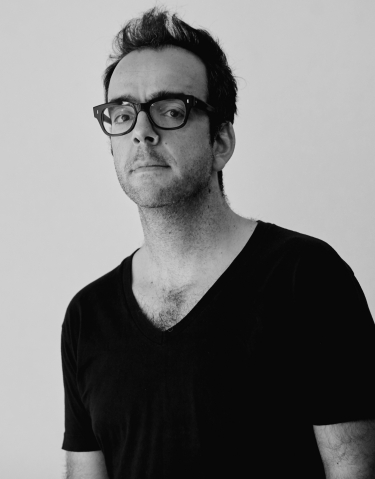
The music of Anthony Pateras covers vast expanses of composition and improvisation, of acoustic and electronic instrumentation, and combinations of these. He is also a virtuosic pianist. Between 2012 and 2019 he created Immediata, an ambitious series of fifteen albums, self-released over seven years, of music created in various modes and contexts, in order to explore how that process would change him as a musician and a composer.
Dazzlingly rapid trills, repeated notes, and arpeggios at the upper middle and high end of a piano keyboard. A violin whistling, gasping, piping at the same breakneck speed as the piano, in the same register. Both carry on relentlessly for nearly fifty minutes, sometimes making brief excursions a bit further down. Then suddenly, some ten minutes before the end, the pianist takes a plunge toward the lower end of his keyboard to perform thundering rolls there, gradually moving further down while the violin warbles like a songbird in a state of panic. The pianist is Anthony Pateras, the violinist is Erkki Veltheim, and the piece is Entertainment = Control—the single track of the namesake album and the third entry in Immediata, the ambitious fifteen-volume, music-and-text series that Pateras released on his Immediata label between 2012 and 2019.
Pateras, who hails from Australia and spends half of each year in Europe, has been active as a musician on various circuits and in various disciplines since the late 1990s. The music in Immediata, which covers sixteen years of creative work, attests to this. The series title derives from a work in the first volume of the series—a work originally commissioned by the Australian National Academy of Music in Melbourne in 2010, when Pateras was composer-in-residence there. The piece synthesizes notation, improvisation, and electroacoustic music, and in that sense encapsulates the entire series. Immediata is bookended by two five-CD volumes—Collected Works 2002–2012 (IMM001) and Collected Works Vol. II (2005–2018) (IMM015)—while the intermediate albums, all in differently coloured monochrome jackets, cover the above-mentioned aspects of Pateras’s work.
The albums mostly feature musicians from Australia and Europe and were recorded in those parts of the world, one notable exception being Rêve Noir (IMM013), a recording of a duo concert with Stephen O’Malley, the American guitarist of noise-and-metal-band Sunn O))) fame. Pateras started the series to challenge his own musicianship as a creator and as a performer. One way to achieve this was to record a large variety of styles and approaches: as a soloist, performing with other musicians, as a composer for ensembles of varying sizes, and working both with acoustic instruments and with electronics. “What I really wanted was to change my musical language through this process. I wanted to start the series as one composer-musician, and finish as another. Part of that is trying very directed yet different things with different people; I wanted each and every disc to be very distinct, as if a different person had made each one. I wanted to be genre-fluid, and hopefully transform my thinking through that. Regarding the decision to make it fifteen, this stuff isn’t cheap to do, plus the idea of releasing my own music forever was somehow deadening. I gave myself a time limit, to do and say something very contained and focused, plus I didn’t want it to become this dreary self-marketing thing. Reinvention is key if you’re in for the long haul. It’s not about keeping other people interested, it’s about keeping yourself interested.”
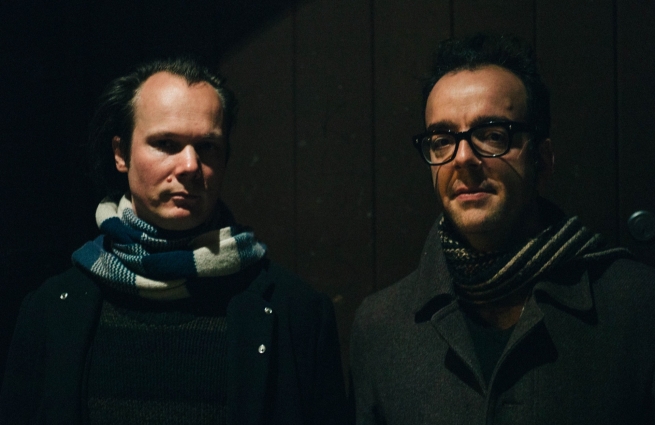
Immediata is not just about the recorded music and musicians. The texts accompanying the albums are of equal importance. It was the intention to combine the recordings with texts that would reflect upon the music on that album. Some consist of fragmentary notes, as if they were lifted from a diary; others are extensive interviews and conversations between Pateras and musicians featured on a specific album. The conversation with Erkki Veltheim in the booklet for Entertainment = Control (IMM003) is particularly enlightening. At one point Veltheim remarks, “I think I have only got to where I am through doubt, which works like a nervous energy that incessantly keeps me questioning what I do.” That statement seems equally true for Pateras. In discussing their approach to music, Pateras brings up the Marx Brothers films: “What I love about those films is that they manage to integrate an incredible sense of genuine surprise into what is a clearly established macrostructure.” Veltheim asks, “Should an Anthony Pateras piano solo be viewed through the prism of Chico Marx rolling an apple across the keys?” To which Pateras replies, “I’ve always been attracted to musicians who successfully re-contextualize the materials at hand, so in terms of piano playing, Chico Marx certainly qualifies. The apple technique is a wonderful precursor to the rapid textures Nancarrow later discovered. I’m the worst person to say how my music should be viewed, but perhaps a useful thing to say is that I’m always trying to get the piano out of the piano. Chico’s apples and Nancarrow’s roll do the same for me.” In the text accompanying the piano solo Blood Stretched Out—on the album of the same title (IMM008)—Pateras slightly rephrases this, stating that “the piano must transcend its physicality, become a motherless disconnect from its history; be itself”; and on the list of techniques he used for performing Chromochromatics (on Blood Stretched Out) Pateras includes “10 note ascending ostinati with Chico gunshots.”
“The interviews and texts were a big part of the idea—trying to create a discourse that wasn’t overly complex or dry around making this kind of music, but also not trying to be ‘cool’,” says Pateras, adding that he’s “heavily into” Chris Kraus, American author and editor at Semiotext(e), and her idea of ficto-criticism—essentially, talking about musical ideas with the same intensity and cadence as the party you went to last night. “Kraus works with a radical honesty that discovers revelatory truths about whatever she’s dealing with. It’s painful, it’s awkward, it’s not smooth, yet it’s always very eloquent and succinct. In terms of talking about music, hardly anyone is ever like that. Certainly between musicians, it’s often either overly brutal and mean, or it’s vague and undisciplined. There’s got to be a third way which creates an intelligent discourse which is backed up with strong examples, otherwise it’s just this pointless subjectivity. The infuriating thing I find, especially in improvised and electronic contexts, is that it’s so high school; being cool, dropping the right names. Things like technique, discipline, structure, harmonic and timbral nuance become secondary. It’s all about the illusion around the person, and that really is not musically interesting. It’s got nothing to do with the acoustical reality of what they’re doing. I maybe never got there, but this concept from Kraus of brutal honest reportage and passion without stylistic restrictions was front and centre in my mind, specifically about the experience of making music and the people I make it with.”
It is exactly those “secondary” aspects of music that get discussed in the accompanying inserts. These texts provide insights into processes of creativity that extend over several years, rather than just being snapshots from a moment in time. As such, Immediata could be called the musical equivalent to a semi-autobiographical bildungsroman, in that it marks and traces Pateras’s development. He already hints at it in conversation with fellow pianist Chris Abrahams, who is probably best known as a member of the Australian trio the Necks, with whom he recorded Music In Eight Octaves (IMM011): “It’s a beautiful thing to remember, to play ideas and not worry about them, to engage with the sensual pleasure of playing. That’s something I find that can be very elusive as an improviser, because I think you need to be very relaxed within yourself and your abilities to achieve that kind of peace and relaxation with the instrument.”
In terms of how his engaging in Immediata has changed him, he takes that thought a bit further. “I think it worked out,” he says. “With hindsight I can see that my music has become more sensual, more to do with experience and listening. I also don’t feel now that when I sit down at the piano, I have to demonstrate a certain kind of technical virtuosity. Now I feel that I can play for pleasure and listen more to decay, to the contact of the hammer and string, work with that—these fundamentals of sound production.”
He expresses similar notions when discussing his 2016 performance of Blood Stretched Out on the Glenn Gould piano in the foyer of Roy Thomson Hall in Toronto. It was a pre-concert performance before the evening’s main program, in which the Toronto Symphony Orchestra performed Fragile Absolute, one of the pieces he wrote for the Australian National Academy of Music. Blood Stretched Out is a fifty-minute continuum where notes are repeated in a way that creates standing waves and harmonic fields in the performance space. “Although there’s a lot going on psychoacoustically as a result, people tend to focus on the overtly physical aspect,” Pateras explains. “It is perceived as—bizarrely, to me—somehow heroic, which was absolutely never the intention. Blood Stretched Out is a fixed macrocosmic structure with microcosmic flexibility. The pitch materials and registration are set, but the tempi and duration are necessarily malleable, depending on the acoustic of the performance space. Sometimes I sit on things for longer to make the room sing more. Specifically, I remember in Canada I played the opening for ages because it just sounded really great, and that’s what it’s about—enjoying time. I’ve performed this everywhere and am a little tired of it now, so I’ve gone to the other extreme, focusing on touch and sensuality, gentleness—communication in a different way.”
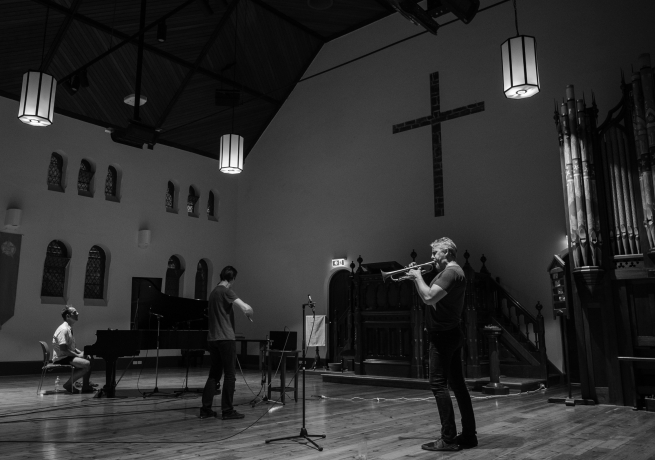
Fellow Australian Erkki Veltheim, who has collaborated with Anthony Pateras since the early 2000s (releases on John Zorn’s Tzadik label, soundtracks for local experimental filmmakers) notes that it was obvious, even in those early days, that Pateras had a special ear for orchestration and a refreshingly original approach to form. “Back then I was mainly collaborating with him as an instrumentalist in his compositions, which he chiefly wrote for close colleagues who had developed their own idiomatic playing styles,” Veltheim relates. “I liked that idea of creating a close-knit community of musicians who shared a curiosity for challenging received instrumental and compositional tropes while maintaining a sense of rigour and discipline in their practice, an approach that defines Anthony’s entire career, whether as a composer, improviser, or curator.”
In the last ten years, Pateras and Veltheim have worked in a more improvisatory context, both as a duo and in the trio North of North with trumpet player Scott Tinkler. “Our duos began in a fairly maximalist vein, but have more recently developed into quite a different approach, exploring long-range acoustic and psychoacoustic phenomena and the materiality of sound,” Veltheim continues. “These pieces—which so far have been scored for violin and piano, electric violin and pipe organ, and viola and celesta—exist somewhere between composition and improvisation, and are very much a product of our converging interests in how to move away from music as a representation of ideas and towards a presentation of sonic phenomena in real time. This duo, and our conversations around it, has been hugely influential to the way I have come to think and rethink composition and improvisation, and I believe that’s partly to do with a really productive combination of congruity and friction between our respective ideas about both music and life in general.
“Meanwhile, the trio North of North has become our main vehicle for maximalist, polystylistic free improv, where virtuosic instrumentalism crosses over into an ecstatic, egoless stream of consciousness. Again, the energy of this music comes from just enough divergence in our respective musical pasts and influences, combined with a kind of hyperawareness of each moment, where our collective mind ends up creating combinations on the fly that, to many people, sound precomposed. I think that’s the result of each of us being conscious of both the instant as well as the role of that instant in the longer musical trajectory, without shackling one to the other. So things can have a particular momentum, but that momentum can just as suddenly change direction. For me, that’s always been a key ingredient in Anthony’s music across his whole practice, and one that I relate to both musically and also ethically. It’s as if you’re creating a machine or a universe that follows certain rules, but at any point these rules can change and reveal an alternative perspective on the same materials. Objects can both explode and implode. Anthony has always personified that type of pluralism, both externally and internally: in who he chooses to work with, as well as how he develops his musical ideas, whether the outcome is an avant-pop song, a multichannel electronic soundscape, a solo piano improvisation, or orchestral concert music.”
Now that the Immediata series is completed, Pateras is creating collaborative work in other contexts. In 2019, Penultimate Press released a duo album of Pateras and long-time collaborator French electroacoustic composer and improviser Jérôme Noetinger entitled A Sunset For Walter—a tribute to the Italian composer Walter Marchetti, who devised pieces in which he makes a piano sound as if it is played under water.
Noetinger first encountered Pateras through Thymolphthalein, the group they cofounded in 2009 with Natasha Anderson (contrabass recorder, computer), Will Guthrie (percussion), and Clayton Thomas (double bass). “He had arranged these musicians,” Noetinger recalls, “with a very precise conception of tiny cells, organic structures, which grew to better gain, through practising, an autonomy of their own. Personally, I learnt very much during the unfortunately too-short lifespan of this group: to play in service to other musicians, to preserve essential gestures for a greater musical clarity, to use temporal restrictions, to share a mode of listening, that of Anthony Pateras.” Later on, they started to work as a duo, first in Pateras’s hour-long 2012–13 composition for percussion sextet, Beauty Will Be Amnesiac Or Will Not Be At All (IMM009). A Sunset For Walter is four excerpts from a three-hour concert that was part of Pateras’s 2018 residency at Schloss Solitude in Stuttgart, during which the duo developed a major durational work for Steinway piano and multiple Revox tape machines. “It is a total immersion in which the piano stretches itself out, falls apart, drowns and resists, in the threads of the magnetic fabric that make it move,” Noetinger describes. “I am still impressed by Anthony’s ability to play without being disturbed by my actions, and to concentrate on the form and the awareness of the time. And to put a cherry on the cake, we love to share some bottles of natural wine, and thoughts about literature, films, or albums.”
Although more albums have come out, for the moment Pateras is done with releasing music himself: “I have no idea what the future holds but I certainly don’t feel I need to release as much music. My focus is moving away from work designed for recording and more into architecturally specific spaces and ensemble configurations. I feel free leaving the label behind; it’s quite weird after a while to be so involved with yourself, you begin to feel like a thing, an object. This is a problem in the arts in general, and that’s why there’s so many mental health issues. This is not genre- or practice-specific; it’s part of this horrible thing of having to monetize yourself, which is, as a human being, dehumanizing.”
For now, Pateras has plenty going on. There’s tētēma, an experimental electroacoustic rock band with Mike Patton from Faith No More; he’s writing “sort of abstract, Bacharach-ish stuff” for his duo Astrids with Swiss sound and visual artist Asi Föcker; and Druck, a psychoacoustic project with Slovenian composer Maja Osojnik. “Songcraft is a very challenging form of composition and requires very sophisticated musical thinking and nuance,” he says. “It teaches you a lot about variation, about when to bring things in and out, about registration, the relationship between melody and harmony, and all in a raw and direct way. In some ways it’s much harder to write a good song than a convincing ‘avant-garde’ chamber piece—at least for me. And now I’m very interested in that challenge, to succeed in making something I want to listen to repeatedly, you know, like my favourite records.”
And in terms of compositional strategy, he continues, songcraft is flexible. “For tētēma, I tend to improvise for hours on synths and tape machines, cut a small piece out which sounds good, then structure a whole song on it. The drums come next, then the violin, then the voice—it’s very organic, very fungal. The Astrids stuff is all-out enhancing Asi’s extraordinary voice, being abstract yet sincere, meaningless yet very suggestive. With Maja it’s a kind of sibling ritual, a kind of secret between fellow travellers who understand certain unnameable things. With Jérôme it’s about memory, interplay, submerged, murky atmospheres, Messiaen, honing the ear to create an illusion between acoustic reality and suggestion.”
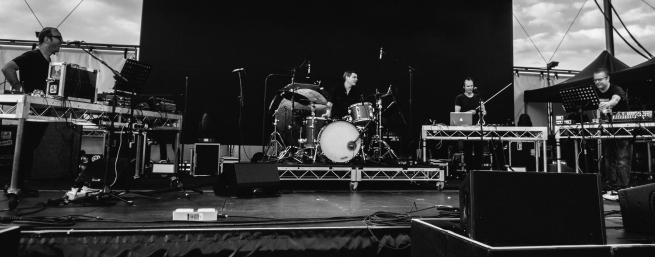
Audio: Ersatz 2019, composed and performed by Anthony pateras (celeste) and Erkki Veltheim (viola).
Top photo of Anthony Pateras by traianos Pakioufakis.
Photo of Erkki Veltheim and Anthony Pateras by Aaron Chua.
Photo of Erkki Veltheim and Anthony Pateras by Aaron Chua.
Photo of North of North by Aaron Chua.
Photo of tētēma by Aaron Chua.


